- Home
- C. S. Pacat
Kings Rising Page 3
Kings Rising Read online
Page 3
The first misstep, and it was his own. He could feel the distracting beat of his heart. ‘What else did my uncle tell you I’d say?’
‘He said you’d try to keep me talking. He said you had a mouth like a whore. He said you’d lie, wheedle, suck up to me.’ The slow smile widened. ‘He said, “The only way to make sure my nephew doesn’t talk his way free is to cut his tongue out.”’ As he spoke, Govart pulled out a knife.
The room around Laurent greyed; his whole attention narrowed, his thoughts attenuating.
‘Except that you want to hear it,’ said Laurent, because this was only beginning, and it was a long, winding, bloody road till the end. ‘You want to hear all of it. Every last broken syllable. It’s the one thing my uncle never understood about you.’
‘Yeah? What’s that?’
‘You always wanted to be on the other side of the door,’ said Laurent. ‘And now you are.’
* * *
By the end of the first hour (though it felt longer), he was in quite a lot of pain, and was losing touch with how much, if at all, he was delaying or controlling what was happening.
His shirt was now unlaced to the waist and hung open, and his right sleeve was red. His hair was a tangled mess ribboned with sweat. His tongue was intact, because the knife was in his shoulder. He had accounted that a victory, when it had happened.
You had to take pleasure in small victories. The hilt of the knife protruded at an odd angle. It was in his right shoulder, already dislocated, so that breathing was now painful. Victories. He had come this far, he had caused his uncle some small consternation, had checked him, once or twice, forced him to remake his plans. Had not made it easy.
Layers of thick stone stood between him and the outside world. It was impossible to hear anything. It was impossible to be heard. His only advantage was that he had managed to free his left hand from its bonds. He couldn’t let that be discovered, it would gain him nothing. It would gain him a broken arm. It was growing harder to stick to a course of action.
Because it was impossible to hear anything, he reasoned—or had reasoned, when more detached—that whoever had put him in here with Govart would return with a wheelbarrow and sack to take him out, and that this would happen at a prearranged time, since there was no way for Govart to signal. He therefore had a single goal, like moving towards a retreating mirage: to reach that point alive.
Footsteps, getting closer. The metallic scrape of an iron hinge.
Guion’s voice. ‘This is taking too long.’
‘Squeamish?’ said Govart. ‘We’re just getting started. You can stay and watch if you like.’
‘Does he know?’ Laurent said.
His voice was a little hoarser than it had been starting out; his response to pain had been conventional. Guion was frowning.
‘Know what?’
‘The secret. Your clever secret. What it is you have on my uncle.’
‘Shut up,’ said Govart.
‘What is he talking about?’
‘You never wondered,’ said Laurent, ‘why my uncle kept him alive? Why he kept him in wine and women all these years?’
‘I said shut your mouth.’ Closing his hand around the hilt of the knife, Govart turned it.
Blackness burst over him, so that he was only distantly aware of what followed. He heard Guion demanding, in a tinny voice far away, ‘What’s he saying? You have some private arrangement with the King?’
‘You keep out of it. This isn’t your business.’ Govart.
‘If you have some other arrangement, you will disclose it to me, now.’
He felt Govart let go of the knife. Lifting his own hand was the second hardest thing he had ever done, after raising his head. Govart was moving to face down Guion, blocking his path to Laurent.
Laurent closed his eyes, wrapped his unsteady left hand around the hilt, and pulled the knife out of his shoulder.
He couldn’t contain the low sound that escaped him. The two men turned as his fumbling hands cut his remaining bonds, and he staggered to stand behind the chair. Laurent held the knife in his left hand in as close to a correct defensive posture as he could presently manage. The room was wavering. The hilt of the knife was slippery. Govart smiled, amused and pleased, as a jaded voyeur at some unexpected minor final act of a play.
Guion said, with mild irritation but absolutely no urgency, ‘Get him back under control.’
They faced each other. Laurent had no illusions about his skill as a left-handed knife fighter. He knew how negligible a threat he presented to Govart, even on a day when he wasn’t swaying. At his best, he would land a single knife strike before Govart closed on him. It wouldn’t matter. Govart’s structural bulk of muscle was layered over with a secondary bulk of fat. Govart could weather a single knife cut from a weakened, weaker opponent, and keep fighting. The outcome of his brief excursion into freedom was inevitable. He knew it. Govart knew it.
Laurent made his single clumsy left-handed strike with the knife, and Govart countered it, brutally. And indeed, it was Laurent who cried out at the tearing pain beyond anything he had ever known.
As, with his ruined right arm, Laurent swung the chair.
The heavy oak hit Govart in the ear, with the sound of a mallet striking a wooden ball. Govart staggered and went down. Laurent half staggered, too, the weight of the swing taking him part way across the cell. Guion was moving desperately out of his way, pressing his back to the wall. Laurent focused all his remaining strength on the task of reaching the barred door and placing himself on the other side of it, dragging it closed behind him and turning the key that was still in the lock. Govart didn’t get up.
In the stillness that followed, Laurent found his way from the bars, to the open corridor, to the opposite wall, which he slid down, finding at the midway point that there was a wooden bench, which took his weight. He had expected the floor.
His eyes closed. He was dimly aware of Guion, tugging at the cell bars, which rattled and clanged and stayed irrefutably closed.
He did laugh then, a breathless sound, with the sweet, cool feel of the stone at his back. His head lolled.
‘—how dare you, you worthless traitor, you’re a stain on your family’s honour, you—’
‘Guion,’ said Laurent, without opening his eyes. ‘You had me tied up and locked in a room with Govart. Do you think name-calling will hurt my feelings?’
‘Let me out!’ The words ricocheted off the walls.
‘I tried that,’ said Laurent, calmly.
Guion said, ‘I’ll give you anything you want.’
‘I tried that too,’ said Laurent. ‘I don’t like to think of myself as predictable. But apparently I cycle through all the usual responses. Shall I tell you what you’re going to do when I stick the knife in for the first time?’
His eyes opened. Guion took a single, gratifying step back from the bars.
‘You know, I wanted a weapon,’ said Laurent. ‘I wasn’t expecting one to walk into my cell.’
‘You’re a dead man when you walk out of here. Your Akielon allies aren’t going to help you. You left them to die like rats in a trap at Charcy. They’ll hunt you down,’ said Guion, ‘and kill you.’
‘Yes, I’m aware that I have missed my rendezvous,’ said Laurent.
The passageway flickered. He reminded himself that this was just the torch. He heard the dreamy sound of his own voice.
‘There was a man I was supposed to meet. He’s got all these ideas about honour and fair play, and he tries to keep me from doing the wrong thing. But he’s not here right now. Unfortunately for you.’
Guion took another step back. ‘There’s nothing you can do to me.’
‘Isn’t there? I wonder how my uncle is going to react when he finds out that you killed Govart and helped me to escape.’ And then, in the same dreamy voice, ‘Do you think he�
�ll hurt your family?’
Guion’s hands were fists, like he still had them wrapped around bars. ‘I didn’t help you escape.’
‘Didn’t you? I don’t know how these rumours get started.’
Laurent regarded him through the bars. He was aware of the return of his critical faculties, in place of which up to now had been the tenacious adherence to a single idea.
‘Here’s what has become painfully clear. My uncle instructed that if you captured me, you were to let Govart have me, which was a tactical blunder, but my uncle had his hands tied, thanks to his private arrangement with Govart. Or maybe he just liked the idea. You agreed to do his bidding.
‘Torturing the heir to death wasn’t an act you wanted attached to your own name, however. I’m not certain why. I can only surmise, despite a truly staggering array of evidence to the contrary, that there is still some rationality left on the Council. I was put in an empty set of cells, and you came with the key yourself, because no one else knows I’m here.’
Pressing his left hand to his shoulder, he pushed away from the wall and came forward. Guion, inside the cell, was breathing shallowly.
‘No one knows I’m here. Which means no one knows you’re here. No one’s going to look, no one’s going to come, no one’s going to find you.’
His voice was steady as he held Guion’s gaze through the bars.
‘No one’s going to help your family when my uncle comes, all smiles.’
He could see Guion’s pinched expression, the tightness in his jaw and around his eyes. He waited. It came in a different voice, with a different expression, flatly.
‘What do you want?’ said Guion.
CHAPTER THREE
DAMEN LOOKED OUT at the sweep of the field. The Regent’s forces were rivers of darker red, driving inroads into their lines, mingling their armies together, like a stream of blood hitting water, then diffusing. The whole vista was one of destruction, an unending stream of enemies, so numerous they were like a swarm.
But he had seen at Marlas how one man could hold a front together, as if by will alone.
‘Prince-killer!’ screamed the Regent’s men. In the beginning, they had thrown themselves towards him, but when they saw what happened to the men who did that, they became a churning mass of hooves trying to fall back.
They didn’t get far. Damen’s sword hit armour, hit flesh; he sought out centres of power and broke them, stopping formations before they began. A Veretian commander challenged him, and he allowed one ringing engagement before his sword sheared through the commander’s neck.
Faces were impersonal flashes, half shielded by helms. He was more aware of horses and swords, the machinery of death. He killed, and it was simply that men got out of his way, or were dead. Everything narrowed to one purpose, determination sustaining power and concentration beyond human endurance, over hours, longer than one’s opponent, because the man who made a mistake was dead.
He lost half his men in the first wave. After that, he took the charges head on, killing as many as were necessary to stop the first wave, and the second, and the third.
Fresh reinforcements arriving at that moment would have been able to slaughter them all like week-old pups, but Damen had no reinforcements.
If he was aware of anything beyond the fight, it was of an absence, a lack that persisted. The flashes of brilliance, the insouciant sword work, the bright presence at his side was instead a gap, half filled by Nikandros’s steadier, more practical style. He had grown used to something that had been temporary, like the flash of exhilaration in a pair of blue eyes for a moment catching his own. All of that tangled together inside him, and tightened, through the killing, into a single hard knot.
‘If the Prince of Vere shows himself, I will kill him.’ Nikandros half spat the words.
The arrows by now were less, because Damen had broken enough lines that firing into the chaos was dangerous for both sides. The sounds were different too, no longer roars and screams, but grunts of pain, exhaustion, sobs of breath, the clang of swords heavier and less frequent.
Hours of death; the battle entered its final, brutal, exhausted stage. Lines broke and dissolved into mess, degraded geometry, heaving pits of straining flesh where it was hard to tell enemy from friend. Damen stayed on horseback, though bodies on the ground were so thick that the horses foundered. The ground was wet, his legs were mud-spattered above his knees—mud in dry summer, because the ground was blood. Thrashing wounded horses screamed louder than the screams of men. He held the men around him together, and killed, his body pushed beyond the physical, beyond thought.
On the far side of the field, he saw the flash of embroidered red.
That is how Akielons win wars, isn’t it? Why fight the whole army, when you can just—
Damen drove his spurs into his horse, and charged. The men between him and his object were a blur. He barely heard the ringing of his own sword, or noticed the red cloaks of the Veretian honour guard before he hewed them down. He simply killed them, one after another, until there was no one left between himself and the man he sought.
Damen’s sword sheared the air in its unstoppable arc and cleaved the man in the crowned helm in two. His body listed unnaturally, then hit the ground.
Damen dismounted and tore the helm off.
It wasn’t the Regent. He didn’t know who it was; a pawn, a puppet, his dead eyes wide, caught up in this like the rest of them. Damen flung the helm aside.
‘It’s over.’ Nikandros’s voice. ‘It’s over, Damen.’
Damen looked up blindly. Nikandros’s armour was sliced open across the chest, where he was bleeding from a cut, the front plate missing. He used the little name that Damen had been called as a boy; the childhood name, reserved for intimates.
Damen realised that he was on his knees, his own chest heaving like the chest of his horse. His hand was fisted in the fabric of the dead man’s sigil. It felt like closing his hands on nothing.
‘Over?’ The word grated out of him. All he could think was that if the Regent still lived, nothing was over. Thought was slow to return after so long living by action and reaction, the responses of the moment. He needed to come back to himself. Men were dropping weapons around him. ‘I hardly know whether the victory is ours, or theirs.’
‘It is ours,’ said Nikandros.
There was a different look in Nikandros’s eyes. And as Damen looked around at the ruined battlefield, he saw the men, staring at him from a distance, the look in Nikandros’s eyes echoed in their expressions.
And with returning awareness, he saw as if for the first time the bodies of the men that he had killed to get to the Regent’s decoy, and beyond that, the evidence of what he had done.
The field was a rutted earthworks strewn with the dead. The ground was a churned mess of flesh, ineffective armour and riderless horses. Killing ceaselessly, for hours, he had not been aware of the scale of it, of what he had caused to happen here. He saw flashes behind his eyelids, faces of the men he’d killed. Those left standing were all Akielon; and they stared at Damen as at something impossible.
‘Find the highest-ranked Veretian still living and tell them they have leave to bury their dead,’ said Damen. There was a fallen Akielon banner on the ground beside him. ‘Charcy is claimed for Akielos.’ As he rose, Damen wrapped his hand around its wooden pole and planted it in the earth.
The banner was torn and it stood lopsided, weighed down by the mud that spattered over its fabric, but it held.
And that was when he saw it, as in a dream, appearing out of the fog of his exhaustion, on the far western edge of the field.
The herald came cantering across the devastated landscape on a white, glossy mare with a curved neck and a high, flying tail. Beautiful and untouched, he made a mockery of the sacrifice of the brave men on the field. His banner streamed out behind him, and its blazon was Laurent’s
starburst, in blue and shining gold.
The herald reined in in front of him. Damen looked at the mare’s shiny coat, not dirt-covered, not heaving or darkened with sweat, and then at the herald’s livery, in immaculate condition, unflecked by the dust of the road. He felt it rising at the back of his throat.
‘Where is he?’
The herald’s back hit the ground. Damen had dragged him bodily from his horse into the dirt, where he lay dazed and winded, with Damen’s knee in his stomach. Damen’s hand was around his neck.
His own breath was harsh. Around him, every sword was drawn, every arrow notched and ready. His grip tightened before it opened enough to allow the herald to speak.
The herald rolled onto his side and coughed as Damen released him. He pulled something from inside his jacket. Parchment, with two lines on it.
You have Charcy. I have Fortaine.
He stared at the words, written in familiar, unmistakable handwriting.
I’ll receive you at my fort.
* * *
Fortaine eclipsed even Ravenel, powerful and beautiful, its towers high-flung, its jutting crenelles biting the sky. It rose to a sheer, impossible height and, from every vantage, it was flying Laurent’s banners. The pennants seemed to float on the air effortlessly, patterned silk in blue and gold.
Damen reined in as they crested the hill, his army a dark fringe of banners and spears behind him. His order to ride had been unforgiving, calling on his men, the battle barely over.
Of the three thousand Akielons who had fought at Charcy, just over half had survived. They had ridden, fought and ridden again, leaving behind only a garrison to attend to the bodies, the scattered armour and ownerless weapons. Jord and the other Veretians who had stayed to fight were riding with him in a small clump, nervy and uncertain of what to do.
By that time, Damen had received the tally of the dead: twelve hundred of us, six and a half thousand of them.
He knew the men were behaving differently towards him since the battle’s end, falling back as he passed. He had seen their looks of fear and stunned awe. Most of them had not fought with him before. Perhaps they hadn’t known what to expect.

 The Adventures of Charls, the Veretian Cloth Merchant
The Adventures of Charls, the Veretian Cloth Merchant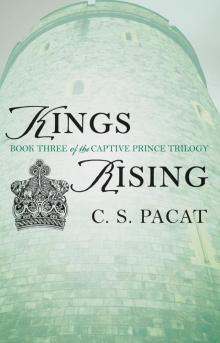 Kings Rising
Kings Rising Green but for a Season
Green but for a Season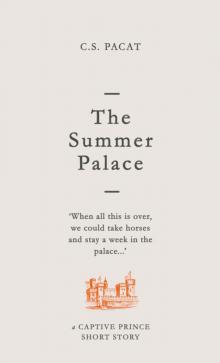 The Summer Palacee
The Summer Palacee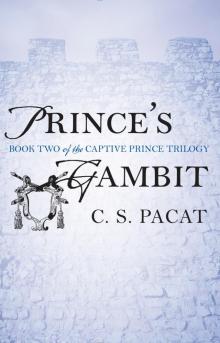 Captive Prince: Volume Two
Captive Prince: Volume Two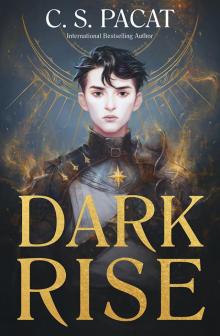 Dark Rise: Dark Rise 1
Dark Rise: Dark Rise 1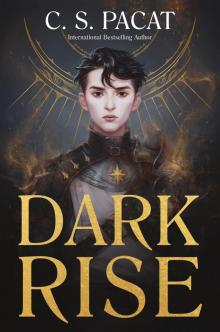 Dark Rise
Dark Rise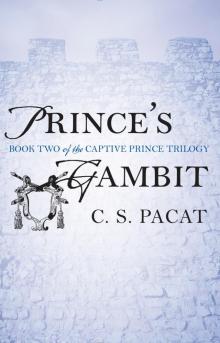 Captive Prince, Volume 2
Captive Prince, Volume 2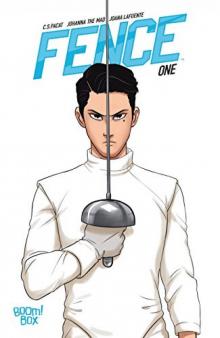 Fence 1
Fence 1 The Adventures of Charls, the Veretian Cloth Merchant: A Captive Prince Short Story (Captive Prince Short Stories Book 3)
The Adventures of Charls, the Veretian Cloth Merchant: A Captive Prince Short Story (Captive Prince Short Stories Book 3) Pet: A Captive Prince Short Story (Captive Prince Short Stories Book 4)
Pet: A Captive Prince Short Story (Captive Prince Short Stories Book 4) Green but for a Season: A Captive Prince Short Story (Captive Prince Short Stories Book 1)
Green but for a Season: A Captive Prince Short Story (Captive Prince Short Stories Book 1)